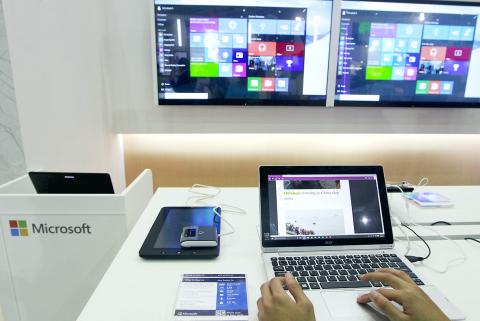Notebook sales are set to drop by 10 percent globally this year, according to Taipei-based market research group Digitimes Research.
In a report, Digitimes said that worldwide notebook shipments this year are expected to be about 156.26 million units, down 9.7 percent from a year earlier.
The research group said the global notebook market underwent inventory adjustments in the first half, and seasonal demand in the second half could still fail to lift demand.

Photo: Reuters
Purchases are set to fall despite the launches of Microsoft’s Windows 10 operating system and Intel’s Skylake central processing unit, which are expected later this year, Digitimes said.
Its forecast excluded hybrid devices which function as both notebooks and tablets.
The researcher said that since the global economy has shown signs of slowing down and a strong US dollar has compromised demand in emerging economies, the global notebook computer market is expected to remain slow in the second half.
The IMF has cut the world’s economic growth outlook for this year to 3.3 percent from an earlier estimate of 3.5 percent, while expectations the US Federal Reserve is set to raise rates this year has strengthened the value of the greenback.
In the first quarter, global notebook computer shipments fell 4.8 percent from a year earlier to 37.59 million units, and in the second quarter sales dropped 9.4 percent year-on-year to 38.32 million units, according to Digitimes.
In the third quarter, notebook shipments are expected to fall 12 percent annually to 39.29 million units while sales are expected to fall 12 percent year-on-year in the fourth quarter to 41.07 million units, Digitimes said.
Digitimes said that Apple Inc would outperform other international brands in the second half.
In terms of contract manufacturers, Taiwan-based Wistron Corp (緯創) is expected to benefit from increased orders from Hewlett-Packard Co, Acer Corp (宏碁) and Asustek Computer Inc (華碩) in the second half, Digitimes said.
Pegatron Corp (和碩) is expected to see orders from Asustek and Toshiba Corp increasing, the researcher said.

To many, Tatu City on the outskirts of Nairobi looks like a success. The first city entirely built by a private company to be operational in east Africa, with about 25,000 people living and working there, it accounts for about two-thirds of all foreign investment in Kenya. Its low-tax status has attracted more than 100 businesses including Heineken, coffee brand Dormans, and the biggest call-center and cold-chain transport firms in the region. However, to some local politicians, Tatu City has looked more like a target for extortion. A parade of governors have demanded land worth millions of dollars in exchange

An Indonesian animated movie is smashing regional box office records and could be set for wider success as it prepares to open beyond the Southeast Asian archipelago’s silver screens. Jumbo — a film based on the adventures of main character, Don, a large orphaned Indonesian boy facing bullying at school — last month became the highest-grossing Southeast Asian animated film, raking in more than US$8 million. Released at the end of March to coincide with the Eid holidays after the Islamic fasting month of Ramadan, the movie has hit 8 million ticket sales, the third-highest in Indonesian cinema history, Film

Taiwan Semiconductor Manufacturing Co’s (TSMC, 台積電) revenue jumped 48 percent last month, underscoring how electronics firms scrambled to acquire essential components before global tariffs took effect. The main chipmaker for Apple Inc and Nvidia Corp reported monthly sales of NT$349.6 billion (US$11.6 billion). That compares with the average analysts’ estimate for a 38 percent rise in second-quarter revenue. US President Donald Trump’s trade war is prompting economists to retool GDP forecasts worldwide, casting doubt over the outlook for everything from iPhone demand to computing and datacenter construction. However, TSMC — a barometer for global tech spending given its central role in the

Alchip Technologies Ltd (世芯), an application-specific integrated circuit (ASIC) designer specializing in server chips, expects revenue to decline this year due to sagging demand for 5-nanometer artificial intelligence (AI) chips from a North America-based major customer, a company executive said yesterday. That would be the first contraction in revenue for Alchip as it has been enjoying strong revenue growth over the past few years, benefiting from cloud-service providers’ moves to reduce dependence on Nvidia Corp’s expensive AI chips by building their own AI accelerator by outsourcing chip design. The 5-nanometer chip was supposed to be a new growth engine as the lifecycle